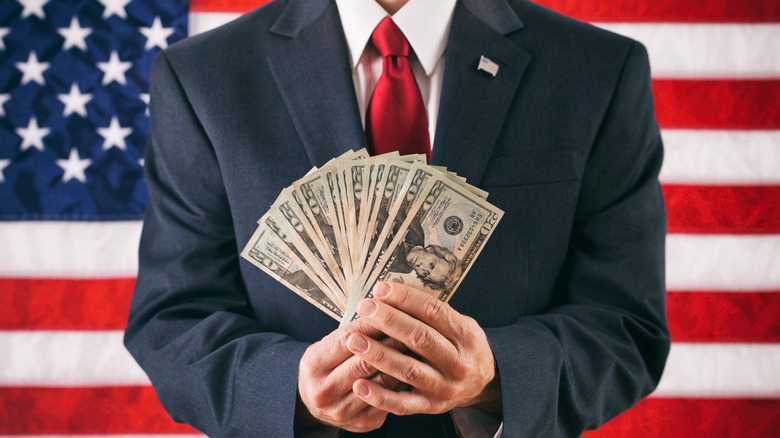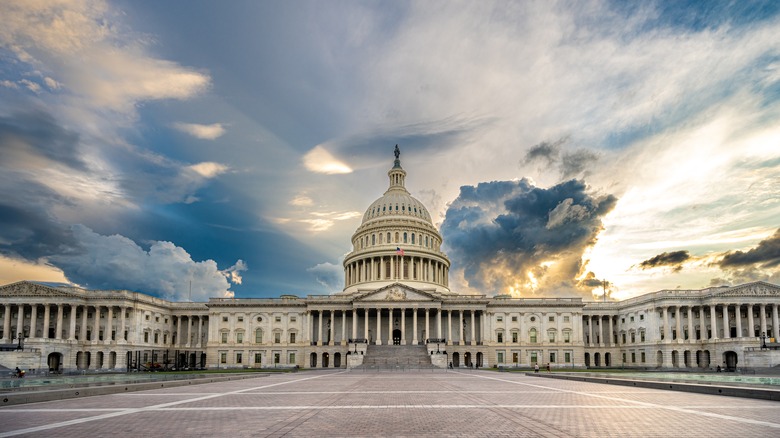The Real Reason American Politicians Are So Wealthy
Kickbacks. Book deals. Speaking engagements. Base salaries. Clever stock deals. Insider info. Financially favorable legislation. Could wealth amongst United States' politicians — a kind of Romanesque neo-patrician class – have such obvious causes? Or, are such reasons only the bitterness of the American public spun into slander? Or, is it the case that certain offices all but require immense wealth even to run, thereby limiting top contenders to those who already have money? Historical Index, for instance, cites $50 to $100 million needed just for a modern presidential candidate to win in the primaries. Open Secrets cites a ludicrous figure of $14.4 billion spent during the 2020 presidential election.
While such figures are higher than ever, democratic societies going all the way back to ancient Athens circa the 5th century B.C.E. struggled with the influence of money in politics. Santa Clara University discusses how certain Athenian offices required citizens to have a minimum amount of wealth in order to run. This turned elections into a game of flattering the public for votes and favors for favors amongst the wealthy and is why philosophical titans like the Greek Plato asserted that democracies inevitably devolve into tyranny, especially when taking a capricious or inattentive public into account, per 3 Quarks Daily.
As it turns out, things really haven't changed. Sites like CBS News point to all of the above mentioned reasons as influencing wealth amongst modern U.S. politicians. Ultimately, those wealthy enough to run largely get wealthier through insider connections when in office.
The greatest wealth in the fewest hands
Short of drafting a 500-page exposé about the open secret of U.S. politicians' wealth, there's a lot of ground to cover in this article. For instance, when we talk about "political office," there's so many different government departments (Department of Energy, Department of the Treasury, Department of State, etc.), agencies (Library of Congress, NASA, Department of Defense, etc.), three branches each with a massive spreadsheet of hierarchical subdivisions, and countless federal, state, local, etc., functionaries, that there is no way to draft one set of rules that applies to everyone. Statista counted more than 19 million U.S. government employees in 2022, all of whom work across 435 different departments and agencies, per The National Archives Federal Register.
So who are we talking about when we talk about wealthy politicians? As sources lead us, we're restricting our discussion to what might be called "the highest offices" in the land, i.e., Congress and the President plus some folks in the President's inner circle. We're excluding Supreme Court Justices because, as CPA Practice Advisor explains, the nine current justices are only collectively worth from $24 to $68 million. Yes, we say "only" because that's a pittance in comparison to many individual Congresspeople. This is fine because if anyone should be upheld to impeccable standards of ethical behavior — including capitalizing on knowledge of financially beneficial insider information, let's say — it's Supreme Court Justices. Many Congresspeople, however, abide by no such principles and are gobsmackingly wealthy.
Big short, big earn
As Congressional Research Services details, Congresspeople in the Senate and House of Representatives have very comfortable annual salaries. All Congresspeople in both houses make $174,000 a year, while those in special positions like Majority or Minority Leaders get $193,400. The Speaker of the House earns the most at $223,500 annually. Such salaries are more than enough to cover sensible people for a lifetime, especially if wisely invested. But are then enough, let's say, to account for Richard Blumenthal's $86.2 million in net worth? Or Michael McCaul's $125.8 million? Or Rick Scott's $200 million?"
Average" is the key, likely overlooked term here. To explain how, let's take an unexpected detour through the excellent 2015 film "The Big Short," which chronicles what happened inside Wall Street leading up to and through the housing market's catastrophic 2008 collapse. The film uses dark humor to tackle how various financiers "shorted" the housing market, i.e., bet against it because they knew it was going to collapse. And so, when it did collapse some people made mountains of money.
On his YouTube channel, independent journalist Johnny Harris discusses how Republican Congressman Spencer Bacchus made this exact same move. Bacchus shorted the market on September 19, the day that the NASDAQ Index plummeted. Did he know this would happen? Yes, in fact. According to Harris, Bacchus attended a secret, closed-door meeting the day prior discussing precisely as much. So those above-mentioned "average" earnings? They point to investments, even inside knowledge.
Insider info equaling millions
As CBS News explains, it's not that those with political power expressively rig things to work in their financial favor (well, maybe), but more, they're hanging around in places where they have foreknowledge of financially beneficial activities. And if Senator So-and-So buys stock knowing that it will go up next week after such-and-such legislation gets introduced? Never mind the wizard behind the curtain.
While this sure sounds illegal, it apparently isn't — at least not for Congresspeople. As Craig Holman, government affairs lobbyist for the non-profit consumer rights advocacy group Public Citizen once said, Congresspeople regularly engage in "the type of insider trading that would send Martha Stewart to prison." He continued, "They go into hearings and confidential meetings with business interests, understanding new legislation is going to come out next week" (via CBS News). This is possible only because the kinds of insider trading laws that apply to ordinary citizens do not apply to whatever is discussed in Congress. Meanwhile, the Securities and Exchange Commission (SEC) says that insider trading amongst private citizens amounts to a maximum fine of $5 million and a maximum prison sentence of 20 years.
This exploit isn't only not accidental, it's by design and written directly into the U.S. House of Representatives Committee on Ethics' list of congressional rules. The rationale, as the document reads, is that it would be "impractical or unreasonable" to assume that Congresspeople can remove themselves from "potentially conflicting assets" of the constituency they are supposed to represent. Therefore: money.
Marriage, celebrity, governance
It might seem odd that so-called "public servants" become obscenely wealthy in their positions of servitude, as investor Grant Cordone pointed out on Twitter (now X) in a tweet that renewed interest in this topic. Many people might not begrudge U.S. politicians for their wealth, citing the same opportunistic money-making that many others might take advantage of if given half a chance. Luck plays a role in wealth, as well, like being born into a wealthy family or marrying into wealth, both of which Go Banking Rates cites as reasons why some Congresspeople are wealthy. While true, this doesn't negate the aforementioned difficulties of obtaining political office without an absurd amount of campaigning money, or problems related to insider info.
On that note, some parts of the Committee on Ethics' Code of Conduct, Rule 23 seem to call out this very point, or at least contradict the previous "impractical or unreasonable" reasoning that allows trading of insider info. "[A]n employee of the House," it reads, "may not permit compensation to accrue to the beneficial interest of such individual from any source, the receipt of which would occur by virtue of influence improperly exerted from the position of such individual in Congress."
While direct cause-and-effect relationships like "influence improperly exerted" might be hard to prove in court, the truth might live in numbers. Open Secrets reports that more than half of Congresspeople are millionaires, with a median salary of over $1 million, while CNBC says 8% of the Americans they represent are millionaires.




